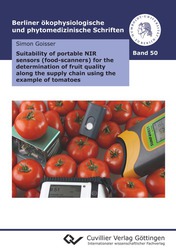| Fachbereiche | |
|---|---|
| Buchreihen (96) |
1381
|
| Nachhaltigkeit |
3
|
| Gesundheitswesen |
1
|
| Geisteswissenschaften |
2370
|
| Naturwissenschaften |
5408
|
| Mathematik | 229 |
| Informatik | 319 |
| Physik | 980 |
| Chemie | 1364 |
| Geowissenschaften | 131 |
| Humanmedizin | 243 |
| Zahn-, Mund- und Kieferheilkunde | 10 |
| Veterinärmedizin | 108 |
| Pharmazie | 147 |
| Biologie | 835 |
| Biochemie, Molekularbiologie, Gentechnologie | 121 |
| Biophysik | 25 |
| Ernährungs- und Haushaltswissenschaften | 45 |
| Land- und Agrarwissenschaften | 1005 |
| Forstwissenschaften | 201 |
| Gartenbauwissenschaft | 20 |
| Umweltforschung, Ökologie und Landespflege | 148 |
| Ingenieurwissenschaften |
1795
|
| Allgemein |
98
|
|
Leitlinien Unfallchirurgie
5. Auflage bestellen |
|
Erweiterte Suche
Suitability of portable NIR sensors (food-scanners) for the determination of fruit quality along the supply chain using the example of tomatoes (Band 50)
Simon Goisser (Autor)Vorschau
Leseprobe, PDF (1,3 MB)
Inhaltsverzeichnis, PDF (25 KB)
Food-scanners are novel, portable and miniaturized devices, which operate on the principle of near-infrared spectroscopy (NIRS). According to the manufacturers, these devices are suitable for measuring a wide range of important quality parameters on fresh produce. This research evaluated the suitability of food-scanners for determining fruit quality along the supply chain of fruit and vegetables. Using the qualitative research approach, the first step of this research comprised interviews of experts at different positions along the fresh produce value chain in Germany. Thereby, preferences and concerns regarding the utilization and implementation of this technology for fresh produce were investigated. Based on these findings, non-destructive prediction models for various important quality characteristics and secondary plant constituents were developed using the model fruit tomato. In addition, food-scanner predictions of relevant quality traits on a wide range of produce from the fruit and vegetable assortment were examined. The evaluations showed a high degree of conformity between the results of non-destructive food-scanner predictions and conventional destructive measurement methods. The results illustrate the great potential of these novel devices for the application in everyday practice of fruit quality control along the fresh produce supply chain.
| ISBN-13 (Printausgabe) | 9783736975439 |
| ISBN-13 (E-Book) | 9783736965430 |
| Buchendformat | A5 |
| Sprache | Englisch |
| Seitenanzahl | 210 |
| Umschlagkaschierung | matt |
| Auflage | 1. |
| Buchreihe | Berliner ökophysiologische und phytomedizinische Schriften |
| Band | 50 |
| Erscheinungsort | Göttingen |
| Promotionsort | Berlin |
| Erscheinungsdatum | 01.12.2021 |
| Allgemeine Einordnung | Dissertation |
| Fachbereiche |
Gartenbauwissenschaft
|
| Schlagwörter | food-scanner, near-infrared spectroscopy, Nahinfrarotspektroskopie, NIRS, NIR spectroscopy, NIR Spektroskopie, NIR spectrometer, NIR Spektrometer, portable NIR spectrometer, tragbare NIR Spektrometer, miniaturized spectroscopy, miniaturisierte Spektroskopie, NIR sensors, NIR Sensoren, SCiO Molecular Sensor, F-750 Produce Quality Meter, Sunforest H-100F, PLSR, partial least square regression, qualitative research, Qualitative Sozialforschung, semi-structured interviews, halbstrukturierte Interviews, Leitfaden-Interviews, non-destructive measurement, quality measurement, zerstörungsfreie Messung, Qualitätsmessung, reference analysis, Referenzanalyse, quality control, Qualitätskontrolle, fruit and vegetables, Obst und Gemüse, fresh produce, Frischeprodukte, fresh produce supply chain, FSC, Wertschöpfungskette Obst und Gemüse, quality traits, quality attributes, Qualitätsmerkmale, tomato, Tomate, Solanum lycopersicum, tomato quality, Tomatenqualität, lycopene content, Lycopin-Gehalt, sugar content, Zuckergehalt, Brix, TSS, SSC, dry matter content, DM, Trockenmasse, Trockenmassegehalt, firmness, Festigkeit, relative water content, relativer Wassergehalt, color values, Farbwerte, tomato color index, TCI, Colorimeter, acidity content, Säuregehalt, Zucker-Säure Verhältnis, Brix/Acid ratio, sugar/acid ratio, portable devices, portable Geräte, handheld devices, Handgeräte, miniaturized devices, miniaturisierte Geräte, practical application, Praxisanwendung, time saving, Zeitersparnis, framework development, Rahmenkonzept Entwicklung, shelf-life estimation, Haltbarkeitsabschätzung |








